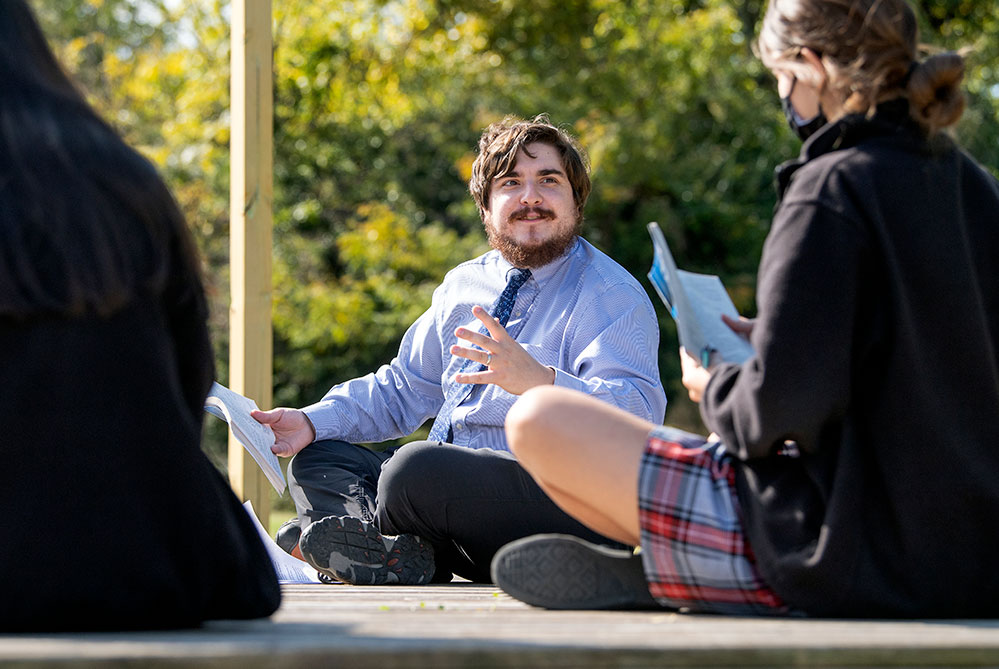
Schools We Serve
The primary models of classical schools in America are Christian schools, public charter and magnet schools, hybrids, and homeschools. As a leading university developing and supporting classical education programs, we employ dedicated experts–from faculty to former K-12 teachers and administrators to home educators–with extensive experience in classical education.
A common goal in all classical models is to guide students in virtue and civil discourse through the arts and habits of the trivium, by way of grammar, dialectic, and rhetoric. Reading, writing, dialectic, and rhetoric converge to unite students into collaborative communities rooted in good citizenship. Despite each school model’s different pedagogical methods, the common goal of forming virtuous citizens is achieved through the dialectical and rhetorical habits we cultivate in our children.
Our team has broad experiences within the liberal arts education renewal in all of the major classical school models. The following are examples of our expertise. This scope of experience and knowledge allows our team and our program to assist all classical schools, regardless of their model or of where they are in their understanding and implementation of classical education.
School Model Expertise
- Transition schools (schools that want to become classical)
- Catholic, Eastern Orthodox, Protestant, and secular schools
- Private and charter schools
- Homeschools and hybrid
Classical Education Expertise
- Catholic Intellectual Tradition
- Mortimer Adler’s Paideia Model (Democratic/Socratic-based Model)
- Socratic Teaching
- Direct Instruction
- Charlotte Mason Pedagogy
- Trivium
- Core Knowledge® Sequence
- Explicit Phonics (Spalding®, Riggs®, Spell to Write and Read®)
I really cannot even begin to tell you how much joy teaching this Latin curriculum is bringing me and the students of St Joseph. I have to share this with you. Last night, my 4 year old (who is in Kindergarten) told me spontaneously, ‘Mommy, Maya cuadam movet’. Maya is our dog. My heart just about exploded. My first grader also spontaneously used Latin yesterday. He said ‘Minime’. Since I have the privilege of being the teacher and a parent, I can see first hand how well this is working.
Amy Carrillo, St Joseph’s Catholic School, Killeen, TX
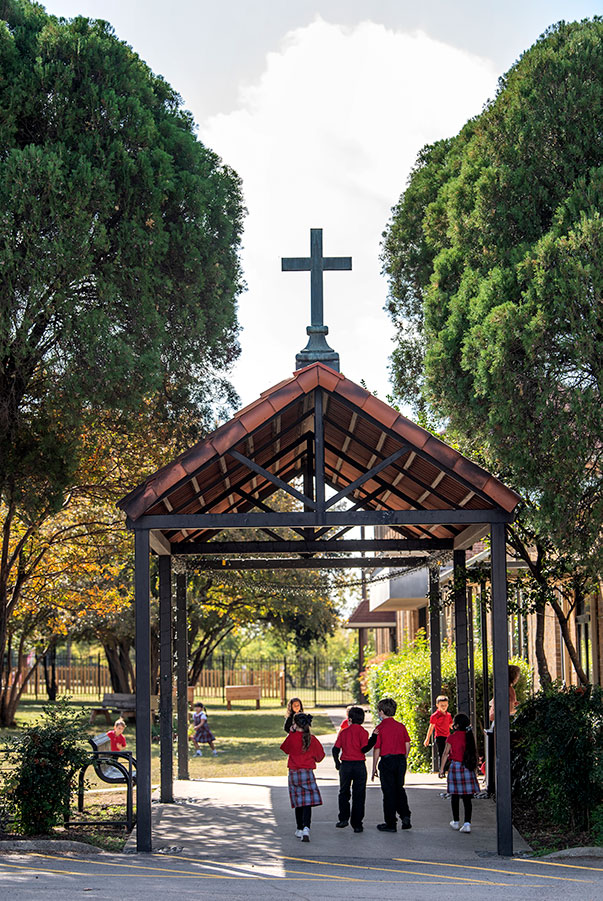
Catholic Schools
As a Catholic university, we expect not only to help students on our campus but also to serve the greater Catholic community with spiritual and intellectual formation. The University of Dallas’s mission is dedicated to the pursuit of wisdom, of truth, and of virtue as the proper and primary ends of education. We believe this can be cultivated and supported at the K-12 level.
Human nature seeks truth, goodness, and beauty. The Catholic intellectual tradition aims to cultivate man’s cardinal, theological, and intellectual virtues, for as the Catechism of the Catholic Church states, “The moral virtues grow through education, deliberate acts, and perseverance in struggle. Divine grace purifies and elevates them” (#1839). The Catholic Intellectual Tradition seeks wisdom through the Church, her sacraments, and the Church Fathers who guide us towards moral and intellectual knowledge. Formation of the soul through seeking wisdom is a core value in Catholic education.
Our experience in K-12 Catholic schools allows us to offer Christ-centered professional development for teachers, education for parents, and a rich, vibrant classical curriculum for students.
UD is the first program I have experienced with such clear, specific directives that lead a teacher to confidently and successfully bring Classical education into their classroom, no matter the grade level.
Lara Pennell, Literature and Religion Teacher, St. Maria Goretti Catholic School, Arlington, TX
Private Religious Schools
Within all the various private classical models, the most consistent feature is the spiritual and character formation of students and teachers. An education in virtue and truth is central.
In these schools, typically students are taught to seek truth, which brings harmony to the order of nature. Truth also points humanity to goodness and beauty. This focus cultivates the soul and helps each person to realize his relationship with the natural and spiritual world. The idea of students learning to discover, examine, and defend Truth, Goodness, and Beauty (the transcendentals) is a central part of the education in most private religious schools.
Our experience working with private religious schools allows us to adjust to the unique needs of each school.
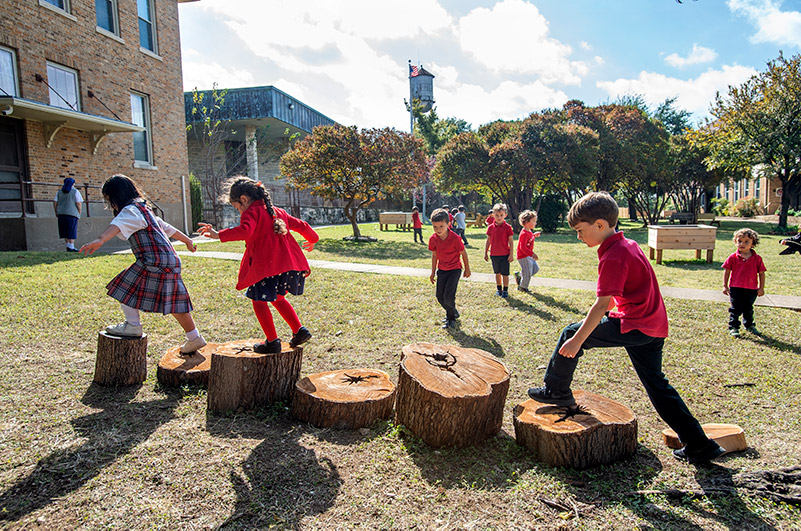
[Your PD presenter’s] recent training was both practical and enlightening for our faculty. She enthusiastically brought her wealth of knowledge of Charlotte Masons’s pedagogy. She left us with many lesson ideas in the art of narration of both texts and pictures, while also connecting Charlotte Mason’s work to the broader classical tradition. We are looking forward to having her back in the future.
Mr. Robert Terry, Director of Curriculum & Faculty Development, Coram Deo Academy, DFW, TX
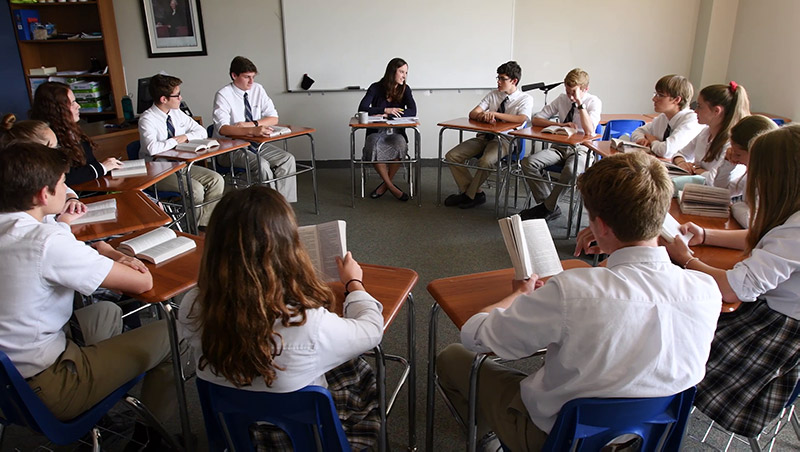
Public Charter Schools
The classical charter school model is rapidly growing. Charter schools are funded by the government and are therefore considered public schools. Many classical charter schools use the Core Knowledge® sequence for grades K-8, explicit phonics programs such as Spalding® or Riggs®, and Singapore® for mathematics.
Many classical charter schools are influenced or inspired by the ideas of “democratic classicism.” The concept behind this movement began with Robert Hutchins and Mortimer Adler through the Great Books program. Socratic discussions, seminars, Great Books, and teaching with classic novels, fables, and fairy tales are the hallmark of these schools. This American Democratic model also places a high emphasis on the virtue of self-governance. The skills of self-governance are developed through habit formation as well as learning the rules for civil discourse. Thus, Socratic seminars are an important practice in the democratic model.
Our experience working for charter schools is extensive and allows our team to support the unique needs of balancing a classical program with the requirements of the state.
I have not received a classical education, but you have evoked my own search for beauty. It seems this is timeless. I am now searching for beauty everywhere. In music, art, sounds. Searching for beauty is a wealth of passion for learning that inspires the soul. It awakens me. Thank you.
Mary Birdsong, Teacher, Corinth Classical Academy
Homeschools & Hybrid Schools
The homeschool movement has various practices of classical philosophy and pedagogy. Some fall within the religious movements and some embrace the democratic model. Others embrace a hybrid of sorts where parents and schools work together (much like a university model). Often, students attend classes a few days a week and homeschool on other days.
Our team includes some members whose experience as home educators is extensive and allows us to support this model of classical education. We come alongside each homeschool, homeschool coop, or hybrid school and help them to grow strong in their own unique missions and goals.
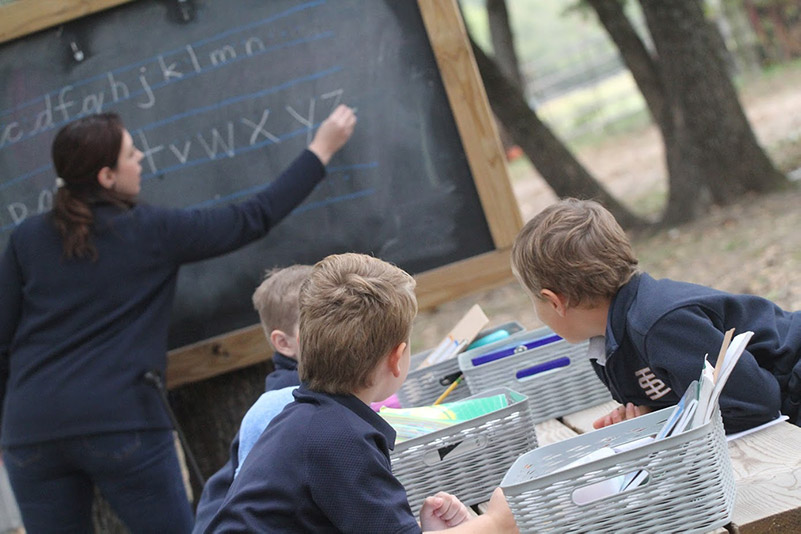
St. Isidore Academy’s partnership with the University of Dallas has given us the strength and support to help make our vision a reality in a very short amount of time. Teachers, students, parents, and administrators are all engaged and genuinely enjoying the education process, which is both rare and a gift.
Brandon Barker, Executive Director, St. Isidore Academy
